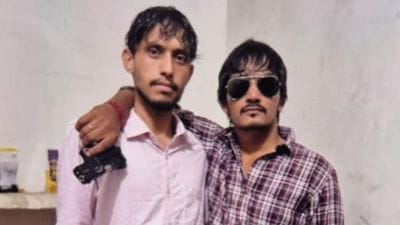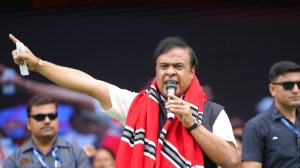‘As I grew, I realised music was safe and I could allow more of myself into it’: Anoushka Shankar
Sitar player Anoushka Shankar on finding the sublime through a trilogy of mini albums, the dichotomy between an artiste's vulnerablity and fear of overexposure, and the disappointment of never taking a Grammy home
 Anoushka Shankar will be on tour this year (Credit: Laura Lewis)
Anoushka Shankar will be on tour this year (Credit: Laura Lewis)In her new mini album Forever, For Now, the first of a scheduled trilogy for the year, 42-year-old Anoushka Shankar, one of the brightest musicians of our times, has decided to capture the subliminity of the ephemeral, which, for her, can only be dignified with music. With songs devoid of the overarching concepts of rhythm, something her training in Indian classical music has ingrained in her being, Anoushka consciously decided to eschew “the analysis of the moments from a future vantage point” and capture the here and now instead.
In the past, close scrutiny of her life has led her to strong and intimate themes such as Traces of You (2012), after the demise of her father and guru Pt Ravi Shankar, and Love Letters (2020), where she looked at infidelity and loss in the wake of her divorce.
The four songs in Forever, For Now have Grammy-winning Pakistani musician Arooj Aftab as producer and German composer Nils Frahm embellishing it with his piano, glass harmonica, harmonium, slit drums and a very elegant presence on the record. The first chapter of the project was released last year on LEITER, the label run by Frahm, and recorded in his Berlin studio. This year, Anoushka will be on a five-city India tour with the album including shows in Delhi and Mumbai. Excerpts from a Zoom interview:
Even though your new album stems from a personal space, it’s a more austere take on how you see the inter-connection betweeeen music and life. How did the idea come about and why did you decide to set it in a trilogy?
I just wanted to do something different and see how it felt to release music in a slightly more immediate way. Partially, that came from working differently post-pandemic. With this, I could just go away for a week, have a wonderful experience working with new producer collaborators, come up with a few songs, then work on them and release them straight away. I was also taken with the idea of having something to release with each kind of geographical area I am touring – North America, Europe and India – places that mean something to me. And then the other desire was a creative one where I just wanted to see how that would impact music; mainly because I think in a very old-school way. When I make albums, my music always follows a theme and there’s a bigger story. But I wondered how it would change if the pieces were freed from being bound together and if there were chapters that could have different themes and moods even if the journey connected. I found the whole process to be very freeing.
Take us back to the sunkissed afternoon and your grandmother’s lullaby that started it all.
It’s called Madhavam mammava and it’s just one of those songs that has struck a nostalgia nerve for me the few times I’ve heard it performed live in a Carnatic concert. I never thought anything of it though. But this one afternoon, I was with my kids in the garden and somehow ended up finding that melody on the sitar and I really liked the way it sounded. My kid fell asleep on my lap while I was playing it and I just thought it would be nice to record a version of the song that was a bit less dynamic, less percussive, and dug into that lullaby feeling. That afternoon meant so much. I was so struck by the beauty of how simple moments can bring us so much peace and joy if we’re connected and present. The album brings back not just that song but that ephemeral feeling.
 Anoushka Shankar Chapter I-Forever, For Now
Anoushka Shankar Chapter I-Forever, For Now
You’ve collaborated with Pakistani musician and vocalist Arooj Aftab on her album Vulture Prince and for a couple of stage shows. What was it like to have her at the helm of a sitar production with Forever, For Now?
We’d collaborated in smaller ways before. Like me, she works in this space that’s slightly undefinable. It’s between genres, it’s beyond genres. She does that in a way that feels really authentic. But, unlike me, she has a lot of space in music. There’s a minimal approach to the music I want to move towards. I felt like she could draw me into that space. We felt like there hadn’t been something in a while where I just allowed the sitar to be at the center of my work and tell the story.
The last few years have seen you delve into a more personal space with music. We’ve seen your fragile side, be it your divorce, your health, speaking about your own sexual abuse or, more recently, speaking about suffering from a debilitating migraine while playing at Edinburgh International Festival. Back in the day music was personal yet not so personal. Does talking about things ever make you feel overexposed and come in the way of making music?
I was raised old school, but there was a real distinction after the Nirbhaya case in Delhi. When I told my own story as a result of that, it felt like one big shift. I’ve been outspoken but I hadn’t talked about something real in my life. It felt like it was important to show that. I thought it would be helpful, not that it’s necessarily gratuitous. But still, my music stayed separate. And I think it just was a gradual process. As I grew up as a woman as I got more and more comfortable in myself, I realised music was safe and that I could allow the music more into me and more of myself in the music. And it was really interesting because I’ve had a different listenership since where people now connect more. Each time I share another layer, it feels safe and you can see that it serves a purpose so that validates itself. In Edinburgh, it was like a weird thing where it felt like I hadn’t done my best. It was still a good show. The band carried me through it but it’s a frustrating feeling when something stops you from being your best. And yet we don’t get to say we were having an off day. There’s a human on the other side of it. There’s got to be a little space to allow for the humaneness of it all. People say sometimes, wasn’t it incredible that he was so sick or her mother had just died and she still performed. It didn’t cancel the concert and we kind of elevate that. As if it’s incredible, but that just sends the message that that’s how we have to be and it perpetuates a lack of space for our own being. So I felt slightly resentful about that in a historical way after the show. I felt there must be other artists who have the same experiences because we all live life while we do our art.
With nine Grammy nominations under your belt, does it get disappointing to still wait for the crowning moment?
For sure. It’s become a bit of a running joke where I’m like, oh, here we go again. Now I’ll be more surprised if I win (laughs). Sometimes in a historical sense, it can kind of feel a little frustrating when you say that ‘do I maybe deserve it’, but then the word deserve is so difficult to quantify. We’re not measuring runners and their microseconds. You can’t quantify. So, in a way, the blessing of it all is that I had my first loss when I was 21. I’ve had to do a lot of work around what that stuff means and whether that has any impact on my worth as a person. So that work has probably been more useful than the award.
Photos





- 01
- 02
- 03
- 04
- 05


























